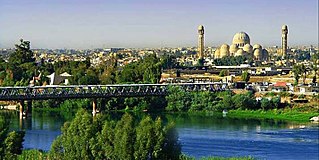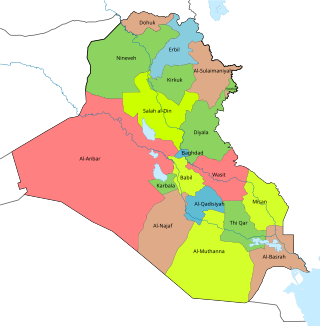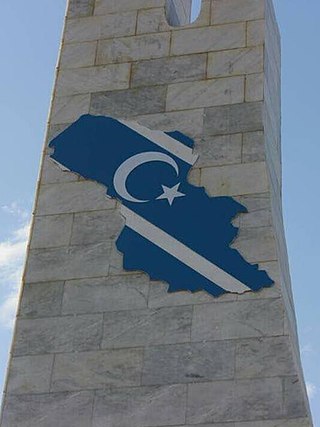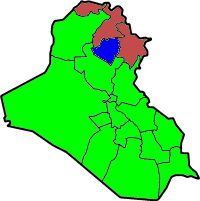Iraq is a federal parliamentary representative democratic republic. It is a multi-party system whereby the executive power is exercised by the Prime Minister of the Council of Ministers as the head of government, the President of Iraq as the head of state, and legislative power is vested in the Council of Representatives.

Kirkuk is a city in Iraq, serving as the capital of the Kirkuk Governorate, located 238 kilometres north of Baghdad. The city is home to a diverse population of Kurds, Turkmens and Arabs. Kirkuk sits on the ruins of the original Kirkuk Citadel which sits near the Khasa River.

Kirkuk Governorate or Kirkuk Province is a governorate in northern Iraq. The governorate has an area of 9,679 square kilometres (3,737 sq mi). In 2017, the estimated population was 1,259,561 people. The provincial capital is the city of Kirkuk. It is divided into four districts.

Nineveh or Ninawa Governorate is a governorate in northern Iraq. It has an area of 37,323 km2 (14,410 sq mi) and an estimated population of 2,453,000 people as of 2003. Its largest city and provincial capital is Mosul, which lies across the Tigris river from the ruins of ancient Nineveh. Before 1976, it was called Mosul Province and included the present-day Dohuk Governorate. The second largest city is Tal Afar, which has an almost exclusively Turkmen population.

Iraq consists of 18 recognized governorates, also known as "provinces". And 1 partially recognized governorate (Halabja). Per the Iraqi constitution, governorates can form an autonomous region. Four governorates, Erbil, Sulaymaniyah, Halabja and Duhok, constitute the autonomous Kurdistan Region. Baghdad and Basra are the oldest standing provinces of Iraq. The second most-populous province, Ninawa is in the upland and quite cool climate of the north-west.

The Council of Representatives, usually referred to simply as the Parliament, is the unicameral legislature of the Republic of Iraq. According to the Constitution of Iraq, it is the lower house of the bicameral legislature of the country. As of 2020, it comprises 329 seats and meets in Baghdad inside the Green Zone.

The Iraqi Turkmen Front is a political movement representing the Iraqi Turkmen people. It was founded on April 5, 1995 as a coalition of several Turkmen parties operating within the framework of Iraq's unity. The party aims for the Turkmen community to have greater political involvement, increased recognition and more rights.

Kurdistan Region is an autonomous administrative entity within the Republic of Iraq. It comprises four Kurdish-majority divisions of Arab-majority Iraq: the Erbil Governorate, the Sulaymaniyah Governorate, the Duhok Governorate, and Halabja Governorate. The KRI is bordered by Iran to the east, by Turkey to the north, and by Syria to the west. It does not govern all of Iraqi Kurdistan, and lays claim to the disputed territories of northern Iraq; these territories have a predominantly non-Arab population and were subject to the Ba'athist Arabization campaigns throughout the late 20th century. Though the KRI's autonomy was realized in 1992, one year after Iraq's defeat in the Gulf War, these northern territories remain contested between the Kurdistan Regional Government and the Government of Iraq to the present day. In light of the dispute, the KRI's constitution declares the city of Kirkuk as the capital of Iraqi Kurdistan. However, the KRI does not control Kirkuk, and the Kurdistan Region Parliament is based in Erbil. In 2014, when the Syria-based Islamic State began their Northern Iraq offensive and invaded the country, the Iraqi Armed Forces retreated from most of the disputed territories. The KRI's Peshmerga then entered and took control of them for the duration of the War in Iraq (2013–2017). In October 2017, following the defeat of the Islamic State, the Iraqi Armed Forces attacked the Peshmerga and reasserted control over the disputed territories.
The first government of Iraq led by Prime Minister Nouri al-Maliki took office on May 20, 2006 following approval by the members of the Iraqi National Assembly. This followed the general election in December 2005. The government succeeded the Iraqi Transitional Government which had continued in office in a caretaker capacity until the new government was formed and confirmed.
The government of Iraq has established a committee to consider a proposed amendment to the Constitution of Iraq.

The Kirkuk status referendum was the Kirkuk part of a planned plebiscite to decide whether the disputed territories of Northern Iraq should become part of the Kurdistan Region. The referendum was initially planned for 15 November 2007, but was repeatedly delayed and ultimately never took place.

The Parliament of Kurdistan, also called the Kurdish Parliament (IKP), is the parliament of the Kurdistan Region in Iraq. It is made up of representatives from the various parties, lists or slates that are elected every four years by the inhabitants of the provinces of Kurdistan Region currently governed by the Kurdistan Regional Government. In 2009 an amendment was applied to the Kurdistan Election Law of the year 1992, and since then the body was referred to as Kurdish Parliament instead of its previous name the Kurdish National Assembly.

Governorate or provincial elections were held in Iraq on 31 January 2009, to replace the local councils in fourteen of the eighteen governorates of Iraq that were elected in the 2005 Iraqi governorate elections. 14,431 candidates, including 3,912 women, contested 440 seats. The candidates came from over 400 parties, 75% of which were newly formed.

Parliamentary elections were held in Iraq on 7 March 2010. The elections decided the 325 members of the Council of Representatives who would elect the prime minister and president. The elections resulted in a partial victory for the Iraqi National Movement, led by former Interim Prime Minister Ayad Allawi, which won 91 seats, making it the largest alliance in the Council. The State of Law Coalition, led by incumbent Prime Minister Nouri Al-Maliki, was the second largest grouping with 89 seats.

Turkmeneli, also known as Turkmenland, and historically as Turcomania, is a political term used to define the vast swath of territory in which the Iraqi Turkmens historically have had a dominant population. The term incorporates the Iraqi Turkmen/Turkoman homelands running from Iraq's border with Turkey and Syria and diagonally down the country to the border with Iran.

The Nineveh Governorate election of 2009 was held on 31 January 2009 alongside elections for all other governorates outside Iraqi Kurdistan and Kirkuk Governorate.

The Kurdistan Region parliamentary elections of 2009 took place on 25 July 2009. A total of 2.5 million citizens of Kurdistan Region were eligible to vote for the parliamentary and presidential elections. People currently living outside Kurdistan Region were not allowed to vote. The elections followed the 2005 Kurdistan Region parliamentary election. The parliamentary elections coincided with the direct election of the President of Kurdistan. Unlike the parliamentary elections in 2005, the president of Kurdistan was to be chosen directly through popular votes. A referendum to approve the constitution of Kurdistan Region originally planned for the same day was put back to 1 August.

Governorate or provincial elections were held in Iraq on 20 April 2013, to replace the local councils in the governorates of Iraq that were elected in the Iraqi governorate elections of 2009. Elections took place in 12 of Iraq's 18 governorates. Elections didn't take place in the 3 governorates forming the Kurdistan Region or Kirkuk, Anbar, or Nineveh, meaning that a total of 378 provincial council seats were up for election.

Najmiddin Karim, also known as Najmaldin Karim, was an Iraqi Kurdish politician who was governor of Kirkuk Governorate from 2011 to 2017. Prior to the invasion of Iraq, Karim had served in numerous Kurdish and Iraqi opposition groups.

Between 1968 and 2003, the ruling Arab Socialist Ba'ath Party of the Iraqi Republic perpetrated multiple campaigns of demographic engineering against the country's non-Arabs. While Arabs constitute the majority of Iraq's population as a whole, they are not the majority in parts of northern Iraq, and a minority in Iraqi Kurdistan. In an attempt to Arabize the north, the Iraqi government pursued a policy of ethnic cleansing and settler colonialism, killing and forcefully displacing a large number of Iraqi minorities—predominantly Kurds, but also Turkmen, Yazidis, Assyrians, Shabaks, Mandaeans, and Armenians, among others—and subsequently allotting the cleared land to Arab settlers. In 1978 and 1979 alone, 600 Kurdish villages were burned down and around 200,000 Kurds were deported to other parts of Iraq.

















